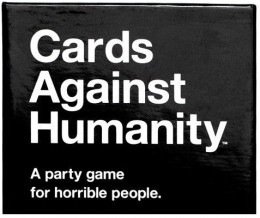
Sucamore Gap on Hadrian’s Wall
Mashable quoted me in Sorry, Cards Against Humanity Can’t Stop Trump’s Wall. It opens,
As much as we may want to believe it, a card game company probably can’t save our country.
This week, owners of the irreverent (and kind of obnoxious, imo) Cards Against Humanity game unveiled their annual PR stunt and it has higher aspirations than last year’s pointless hole.
As part of the Cards Against Humanity Saves America campaign, it announced the purchase of “acres of land” on the U.S.-Mexico border and promised not to build a wall on it.
Going further, the company said that it had retained the services of legal representation specializing in property rights, “to make it as time-consuming and expensive as possible for the wall to get built.”
Sounds good, right? Guess there won’t be a wall!
Not so fast, patriots.
The government has a big ace up its sleeve when it comes to taking land from property owners. It’s called “eminent domain” and it’s right there in the constitution’s Fifth Amendment, below the part that people always talk about on lawyer shows. The Fifth Amendment states the government can’t take “private property be taken for public use, without just compensation.”
But it can still take land for public use, and it almost always does.
Government is mightier than the card game
The several law professors we talked to all came to the same forgone conclusion: the government will ultimately take that land from Cards Against Humanity.
“The power of eminent domain is considered to be a fundamental power of any government to use,” Professor of Law David Reiss at Brooklyn Law school said. And in this case, given the limited facts that were available to him, “ultimately the government would succeed.”
Over the past several decades, the judicial definition of eminent domain has expanded broadly. Historically, governmental use of eminent domain would fall under the umbrella of public use by using the acquired land to build a road or build a hospital. That’s changed in recent years, as the blanket phrase of “public use” has been used in eminent domain cases to include razing blighted urban areas or if the land could be seen as encouraging economic development.
Richard Epstein, Professor of Law at NYU, emphatically agreed that Cards Against Humanity would not stand much of a chance. Legally speaking, he saw, “the wall [will be seen] as a public good. There’s nothing you could do to resist them taking the land.”
Lynn E. Blais, Real Property Law Professor at the University of Texas at Austin, also thought that the government would easily win, but acknowledged how Cards Against Humanity could make an impact.
“They can’t stop the border wall for sure,” Blais said. Legally speaking, “it’s clearly for public use [but] they can challenge the process at every step if they want. That could take a long long time.”
And just as the company mentions in its announcement, it hopes to get in the way and meddle up Trump’s plans to build a wall, at least in that one plot of land it purchased. That delay tactic might prove exceptionally effective.
“They may not be looking to stop it, but merely to delay it. Delay can be very powerful. Sometimes delay can be as effective as winning the case,” Reiss said. “With enough money, it can be delayed for years.”
Did CAH fall down at the starting line?
A few of the legal experts we talked to were adamant that Cards Against Humanity, in openly alluding to the fact that they hoped to make the wall construction “as time-consuming and expensive as possible,” invariably hurt their chances to gain favor with a judge. Basically, in flipping Trump off through a land buy, they exposed their bias and they might not receive a full case because of it.
“I wonder if they shot themselves in the foot if they admitted this was a delay tactic. Some judges might few that negatively,” Reiss said. “Judges wouldn’t look kindly on admitting delay.”
Epstein was very certain that the company’s promotion would hurt their chances of winning any case the federal government might bring against it.
“They are tacitly admitting that the goal is to block the president,” he said. “It’s one one of the dumber ideas I’ve heard of.”
He was certain that it would only invalidate any defense Cards Against Humanity tried to bring up, seeing as how the company already showed its actual intent. Still, he thought of it as a sign of the times, saying, “One of the consequences from the president acting like a crackpot means you get crackpot solutions.”
Blaise, however, believed the opposite side of this argument, and thought that land owners can do whatever they damn well please.
I don’t think it matters why you don’t want the government to take your land. As a property owner, you get to be as irrational as you want,” she said.
So you’re saying there’s a public use chance…
Even though a prospective case doesn’t look too promising for Cards Against Humanity, it still has avenues it can take to launch a defense of their new land. According to the legal experts we talked to, the most promising defense would be on whether the wall is really for public use. This is given that “public use” in the Fifth Amendment is not terribly defined and that arguments could readily be made that a border wall with Mexico might be more harmful than good.
“Public use is now often an incredibly broad term,” Reiss said. And, should the case go to federal court, the government’s potential case would invoke border security or immigration policy, which Reiss thought a judge would probably find compelling evidence.
Like this:
Like Loading...




